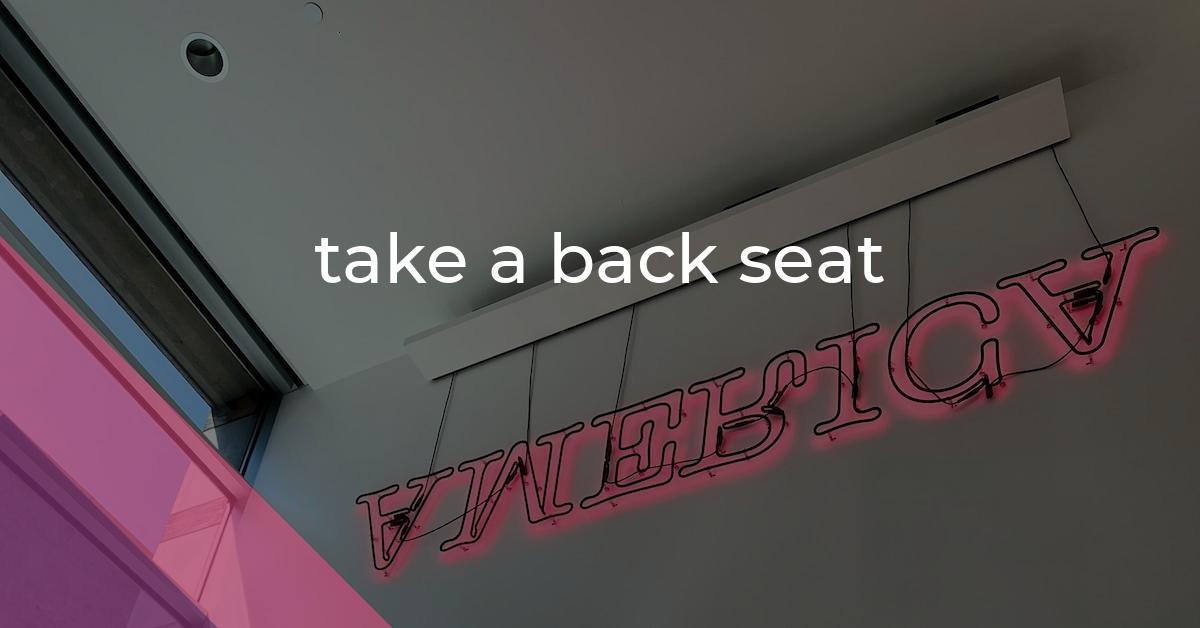take a back seat: Idiom Meaning and Origin
What does ‘take a back seat’ mean?
The idiom "take a back seat" means to take a less prominent or active role in a situation or to allow others to take the lead.

Idiom Explorer
The idiom "take time out" means to pause or suspend activities, often to rest or relax, before continuing with them later.
The idiom "take sides" means to choose or support one person, group, or opinion over another, often in a conflict or disagreement.
The idiom "take a pew" means to sit down or take a seat.
The idiom "step down" means to resign or give up a position of power or authority voluntarily.
The idiom "step back" means to pause, reflect, or withdraw from a situation in order to gain a better perspective or understanding. It suggests the need to take a break and reassess the situation before making any decisions or taking further action.
The idiom "stay behind" means to remain in a place or position after others have left. It implies a deliberate choice to not move forward with others or to stay out of sight for various reasons.
The idiom "stand from under" means to get out of the way or to move aside in order to avoid being hurt or affected by a situation, often a dangerous or unpredictable one.
The idiom "stand down" means to withdraw or relinquish a position or claim, often in response to a request or order.
The idiom "sit on one's hands" means to refrain from taking action or getting involved in a situation, often out of indecision or passivity.
FAIL
sit back is another idiom that is closely related to take a back seat. The phrase "sit back" means to relax and let things happen without taking an active or assertive role. It implies a sense of passivity and letting events unfold naturally, without actively participating or intervening.
In many ways, sit back can be seen as a synonym for take a back seat. Both idioms convey the idea of stepping aside or relinquishing control, but sit back suggests a more relaxed and nonchalant attitude towards the situation. It implies a trust in the process and a willingness to let things happen without actively influencing the outcome.
When someone chooses to sit back, they are essentially allowing others to take the lead and make decisions. This can be seen in various contexts such as group projects, team dynamics, or even social situations where one person may take charge while others prefer to sit back and follow their lead.
take the front seat is an idiom that stands in contrast to take a back seat. While take a back seat implies stepping aside or relinquishing control, take the front seat suggests the opposite - actively seeking a role of importance or influence.
When someone chooses to take the front seat, they are positioning themselves at the forefront, ready to take charge and make decisions. This idiom is often used to describe individuals who are assertive, ambitious, and eager to lead. They are not content with sitting back and observing, but rather prefer to take control and be at the center of the action.
In a way, take the front seat can be seen as the antithesis of take a back seat. While one idiom implies humility and passivity, the other connotes confidence and assertiveness. Both idioms reflect different approaches to leadership and decision-making, highlighting the diverse range of personalities and attitudes that exist in human interactions.
play second fiddle is another idiomatic phrase that shares similarities with take a back seat. However, play second fiddle carries a slightly different connotation. The phrase "play second fiddle" originates from the orchestra, where the second violinist is considered to have a less prominent role than the first violinist.
Metaphorically, play second fiddle refers to accepting a subordinate position or being in a supporting role. It implies being in a position of lesser importance or influence, often playing a secondary or supportive role to someone else. This idiom is commonly used in contexts where there is a clear hierarchy or power dynamic, such as in organizations or relationships.
When someone is said to play second fiddle, they are essentially acknowledging that they are not the main focus or decision-maker. They are willing to take a back seat and support the person or group in the lead. This idiom can imply a degree of humility and selflessness, recognizing that not everyone can be in the spotlight and that collaboration is often key to achieving success.
Take a back seat is an idiomatic phrase that captures the concept of stepping aside or relinquishing a position of importance or influence. It can convey a sense of humility, patience, and adaptability. Related idioms such as sit back, take the front seat, and play second fiddle further explore different dynamics within human interactions, highlighting the diverse range of attitudes and approaches to leadership and decision-making. Understanding these idioms provides insights into the complexities of interpersonal relationships and the balance between asserting oneself and supporting others.
Example usage
Examples of how the idiom *take a back seat* can be used in a sentence:
- During the team meeting, John decided to take a back seat and let his colleagues lead the discussion.
- After the promotion, Sarah had to take a back seat and provide guidance to her successor.
- Although she was the founder of the organization, Alice chose to take a back seat and empower her team to make decisions.
More "Transportation" idioms



